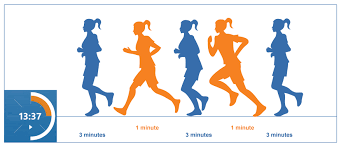This semester, I am taking a graduate class called Understanding, Valuing, and Teaching Struggling Readers. In my first class session last week, my classmates and I had to create a list of characteristics we associate with struggling readers. My partner and I included a lack of interest, stamina, and the ability to retain information, among many, many others. These, in particular, stood out to me as traits that I could immediately address.
 The next day in the intervention classes that I teach, I established Reading Intervals to address these concerns. I explained how when we train as athletes, we often partake in interval training. So why not try it with reading and see if it helps us?
The next day in the intervention classes that I teach, I established Reading Intervals to address these concerns. I explained how when we train as athletes, we often partake in interval training. So why not try it with reading and see if it helps us?
- Lack of interest
- In the article "Taming the Wild Text,"
Allyn notes that students have may be reluctant or lack basic skills
"because they haven't been exposed to materials suited to their
interests, ability, and temperament" (19). To offer my students a wide range of materials, I stopped by the public library and picked up numerous kid books - books, award winners, graphic novels, comics. I left this out for class use, in addition to my classroom library. All students were allowed to choose whatever they wanted to read, regardless of the level of difficulty or ease.
- Stamina/Ability to Retain Information
- Instead of sitting down to read for a long period of time, we started with three minutes of reading. Once the timer went off, I had the kids make some notes about what they were reading in an attempt to help them retain information. They were then given the option to stand up and stretch and/or choose something different to read.
- Before setting the timer for follow-up intervals, I asked the kids for their input on how long they wanted the next interval to be. Allyn states that, "For some reason, setting the timer to odd times...really helps!" (21). I asked if they wanted to stick to three minutes or bump up to five. Every class choose five. One class got brave and asked me to set the timer for ten minutes so they could see how long they would last. The average was seven minutes before they found themselves losing focus.
By the time we got through the entire class period, each student had completed at least fifteen minutes of independent reading. For many, this was an enormous accomplishment.
There were also some unexpected surprises that came along with this impromptu lesson:
- A few students asked if I could get more chapter books from the library for them. They wanted to see if something would catch their interest enough to get them to read an entire book.
- Students were sharing their struggles during the note-taking intervals, allowing me glimpses into their thinking. One of our big focuses in class is metacognition, and this was definitely a moment when my kids were thinking about their thinking.
- Impromptu book talks were taking place. I had helped some of my boys find sports books to read, and every chance they had, those boys were comparing notes about story lines and arguing about who was going to check books out from me first. Can you say "Happy teacher"?
I am definitely going to continue on this adventure as I create reading athletes. I highly recommend checking out Allyn's article, as she discusses strategies to help struggling readers "become fierce, unafraid, and strong" (16).
References
Allyn, Pam. "Taming the Wild Text." Educational Leadership: Reading: The Core Skill:. ASCD, Mar. 2012. Web. 05 Sept. 2016.


